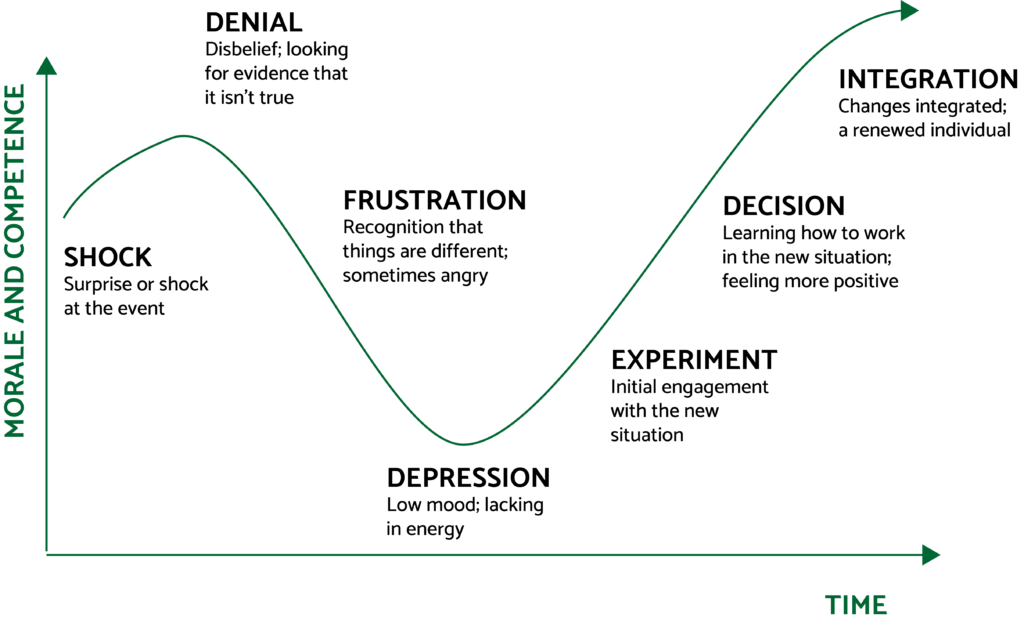Introduction
In a recent mediation of a family matter, we encountered a rather enlightening episode with a mediation judge and our client, which we thought would be wonderful to share with the readers in this issue of “From the Desk …”
At this particular mediation session, we had some difficulty taking instruction from our client because he was still struggling to come to terms with the fact that his wife wanted to divorce him. This had a knock-on effect, because the mediation judge wanted us to tell the Court the next course of action, given the Court wanted to move things along.
Initially we were a little concerned with not being able to update the Court without the client’s instructions, but we were very encouraged by what followed. A few minutes into judge’s dialogue with our client and listening to the thought troubling him, the mediation judge whipped out what looked like the “Change Curve”.

The Change Curve¹was originally invented by Elisabeth Kübler-Ross in her study on how humans cope with grief. Since its initial publication in “On Death and Dying”²,the Curve has been adapted and applied to situations experienced in everyday life, including the “Transition Curve” by Chris Parker and Ralph Lewis, Crainfield School of Management, United Kingdom.
Key Points
Change affects all of us. The bigger the change, the more dramatic and drastic the effects are on us.
Initially, the subject was covered in the most dramatic fashion, studying death and the dying. But over the years, it was discovered that change even in the simplest of ways, affects us as well.
As lawyers, we often see clients who have had change impact them, and then they reach out for legal help on how best to deal with it.
In this article, we introduce the change curve to let you see how you may be affected by what is going on around you.
1. Generally, a person’s initial reaction is shock/surprise, which progresses into denial. People are resistant to change so denial is a common reaction.
2. Realising that denial does not improve the situation, anger and frustration quickly ensue, also because things are not improving.
3. When the personal realizes that the change is genuine, one could experience depression and fixate on small issues and problems due to the insecurities they feel. In order to get out of depression, the person needs to make a choice for himself, going through experimentation of different outcomes.
4. The mental change of pushing one’s self to accepting the fate of the situation, believe it or not, leads to acceptance. Only with acceptance can they welcome relief, new possibilities and a healthier mindset.
5. The final stage is when the individual fully integrates change into their life and the new situation has completely replaced the original. The person would have created a new normal routine and their self-esteem and mood would have risen. Things start looking up.
In this short article, we would like to share with the readers about the Curve and how, perhaps, this curve can be useful to you when you are dealing with a change circumstance, or in situations of upheaval.
One important thing that came through for us was that you can only really flourish by having gone through the different stages and come through to the end where, according to the wise mediation judge, you would then be able to “flourish”.
Each person reacts differently to change. Knowing and being aware of each stage of emotional transition that you are in could give you a clue as to how you could possibly better deal with issues or change in your life. Perhaps then, you could instruct your lawyer better, to help you attain recovery and return to achieve optimal performance and success.
*Prepared in collaboration with Tiffany A. Lai, Undergraduate, Singapore Management University.
___________________


